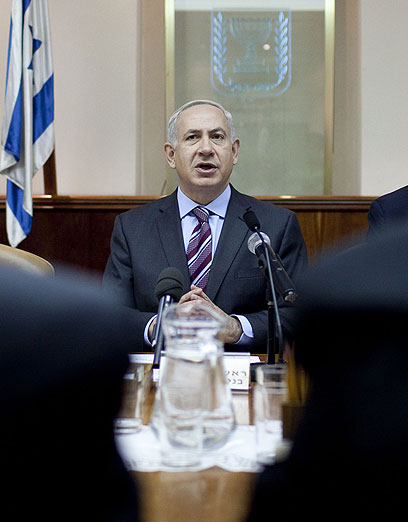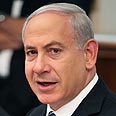The government on Sunday approved amendments to its protocol which expand Prime Minister Benjamin Netanyahu's powers in an unprecedented manner in the backdrop of the Iran strike debate. Under the new protocol, the prime minister will have the power to delay motions passed by ministerial committees and the option to decide government voting orders.
The prime minister's bureau explained that the move is meant to "improve governance." In effect, the amendments mean that Netanyahu would be able to easily secure a majority for fateful decisions.
Related stories:
- 'Netanyahu, Barak mulling fall strike on Iran'
- Op-ed: We'll pay heavy price for Iran mistake
- Op-ed: Netanyahu is no Churchill
The move sparked widespread criticism. MK Amir Peretz (Labor) said in response that the move supports the claim that "the prime minister will do anything to avoid comprehensive and transparent discussions." He described the amendments as "undemocratic." Peretz also criticized the ministers for approving the revised protocol.
Peretz added that if Netanyahu wants to prove that the decision is not related to "the pressing matters of the hour" he should announce that the changes take effect with the election of the next government.
Earlier, Opposition chairman Shaul Mofaz said the plan further undermines the prime minister's decision making process. "We are facing critical decisions and the attempt to weaken opposition only increases concern over the lack of judgment in those decisions," he said.
Labor Party Chairwoman Shelly Yachimovich claimed the move jeopardizes the State of Israel's democratic nature.
"Fateful decisions on political, security-related and socio-economic issues could be reached without meaningful discussion in the government," she warned.
"Netanyahu is forgetting that in Israel issues of this nature are not decided by just one person or even two," she added.

Netanyahu at cabinet meeting (Photo: AFP)
Under the revised protocol, the prime minister is able to delay the implementation of ministerial committee decisions and schedule further discussion on those decisions.
Seeing as the PM controls the cabinet's agenda, he will be able to run his proposals repeatedly until they are approved or conversely "bury" decisions made by ministers, pending further discussion.
Legal concerns
The Prime Minister's Office's legal advisor Attorney Shlomit Barnea Fargo expressed reservations over the clause which she said enables the PM to undermine the decisions of government-appointed committees.
She also raised concerns over the uncertainty created by the fact that no time limit was given to the option of scheduling additional discussions on ministerial committee decisions.
The revised protocol stipulates that decisions can be reached through phone voting – 12 hours after the first call is made. The PM will also have the power to shorten or extend this timeframe.
The PM's aides explained this amendment is meant to prevent a situation where ministers change their positions days after a decision is made. Until now, ministers were given a week to respond to proposed resolutions not discussed at the meetings.
The new protocol will grant the PM virtually unprecedented power. The PM will be able to restrict voting to present participants only, thus ending the practice of voting in absentia. Only ministers on overseas trips who appointed replacements will be able to vote in absentia.
The PM will also be able to attend any ministerial committee meeting and have the same voting power as any other member. This could affect the ministers' voting patterns.
'All other threats shrink in comparison'
Meanwhile, Netanyahu addressed the Iranian threat at the weekly cabinet meeting. "All of the threats on the home front shrink in the face of another threat – Iran cannot be allowed to obtain nuclear weapons," he said.
The prime minister also noted his conversation with UN chief Ban Ki-moon over the weekend in which he urged the secretary-general not to attend a conference in Tehran.
Also Sunday, ministers Yuval Steinitz and Daniel Hershkowitz said the debate surrounding the question of a strike on Iran should be restricted to closed forums and not be held in public.
Moran Azulay contributed to this report
- Receive Ynetnews updates
directly to your desktop
















